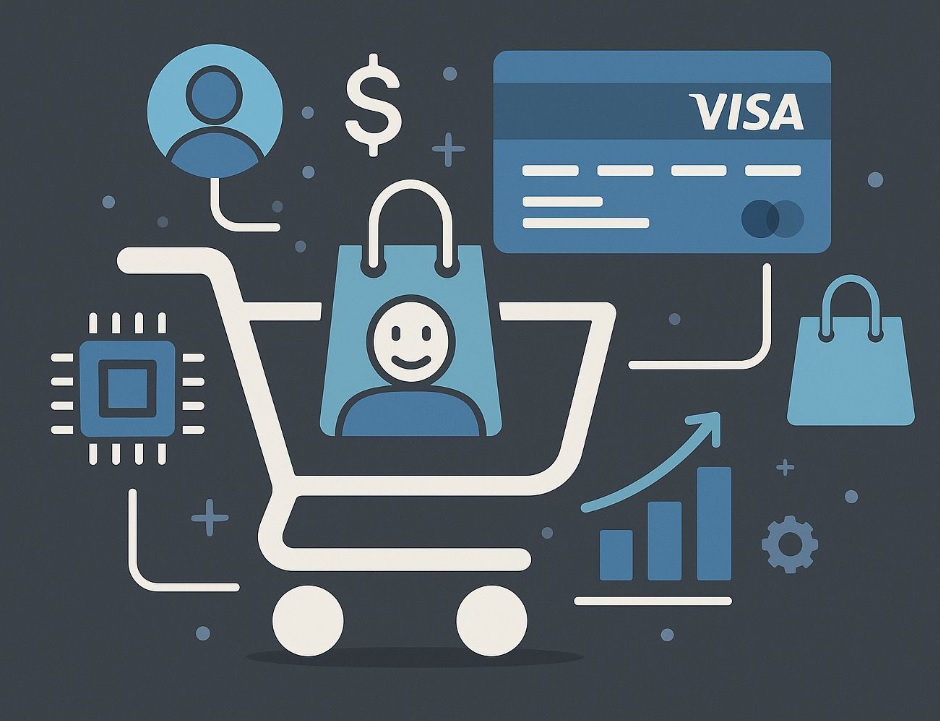AI-powered shopping agents that find, buy, and manage purchases are transforming the online shopping experience as we speak. One of the pioneers in this space is none other than Visa Inc. Their first product, in what we believe will be a series of Visa agentic commerce solutions, is Visa Intelligent Commerce—a product designed to make AI-driven shopping secure, seamless, and widely accessible. Here’s what it is, how it works, and where it fits in the bigger picture.
What Is Visa Intelligent Commerce?
Visa Intelligent Commerce is a new API-based platform launched by Visa to enable AI shopping agents to find, shop, and pay on consumers’ behalf, with minimal human intervention.
Launched at Visa’s April 2025 Global Product Drop, Intelligent Commerce brings Visa into the AI-assisted shopping flow, with the sole goal of making digital commerce more personalized and seamless.
To achieve the latter, consumers still retain control even with AI agents shopping for them. They do so by designating which AI agent can act for them, setting spending limits or filters, and explicitly authenticating any payment instruction. Visa’s network then enforces those rules and streams transaction “signals” back in real time for fraud monitoring and dispute handling.
How Visa Intelligent Commerce Works?
Visa describes the transaction flow as a series of the following steps:
- Agent and user onboarding: Agents register with Visa’s Intelligent Commerce platform, and the user adds their Visa credit card. Visa performs step-up identity verification (such as setting a Passkey) and provisions an agent-specific payment token for that user.
- Instruction authentication: When the user instructs the AI to make a purchase, the intelligent agent requests authorization. The user authenticates the transaction, and Visa logs the authenticated request.
- Tokenized payment issuance: The agent then requests a payment credential from Visa for the specified purchase. Visa checks that this request matches the authenticated user instruction and issues a limited-use token bound to that agent and merchant.
- Checkout: The agent uses the token (containing necessary payment information) to pay the merchant, often via guest checkout or form-fill. VisaNet applies the user’s preset rules (spending limits, merchant category restrictions) and streams transaction data (“signals”) back to Visa for fraud detection and dispute management.
What Is Visa’s Role in the Future of Agentic Commerce?
Visa is positioning Intelligent Commerce as the backbone for the next era of online shopping, and frankly, it’s in a great position to do so. With roughly 4.8 billion cards, 150 million merchant locations, and 14,500+ financial institutions worldwide, Visa already provides the infrastructure to accept global payments.
So, it shouldn’t come as a surprise that its target is broad:
- Consumers looking for easy, secure AI-powered shopping.
- AI developers building autonomous shopping agents.
- Merchants and retailers who want to support agentic checkout.
- Banks and fintechs offering smarter payment controls.
Another thing worth noting is that Visa isn’t going at this alone. They’ve built a full suite of developer tools through the Visa Developer Center, where companies can access the Intelligent Commerce APIs, test in a sandbox environment, and start building their own agentic workflows.
Visa has also partnered with leading AI innovation and fintech players like OpenAI, Anthropic, Grab, Tencent, and Samsung (among others), to ensure their payment capabilities are embedded into existing AI models and ecosystems.
What Are the Practical Use Cases of Visa Agentic Commerce?
On paper, Visa’s agentic AI commerce solutions seem very straightforward and intuitive. And, they are. As of today, you can have trusted agents do all sorts of agentic transactions and tasks through Visa’s APIs, including:
- Online shopping: Agents can recommend clothing or accessories based on your preferences, order or re-order groceries or home essentials, or even shop for birthday gifts instead of you.
- Event planning: An AI agent could manage all purchases for a party or an event. It could select decorations, venues, catering, food and drinks, as well as tickets for events, and then check out using the user’s Visa token.
- Travel planning: AI agents browse for the best travel deals by looking up flights, hotels, and activities that fit your preferences.
Another major bonus is that business operations can also benefit from Visa agentic commerce solutions. AI assistants could handle routine agentic payments like renewing software subscriptions or paying vendor invoices, all within company-set parameters and limits.
What Benefits Can Consumers and Brands Expect From Visa Intelligent Commerce?
Understanding the practical benefits agentic ecommerce solutions like these offer to consumers and ecommerce brands alike is much more important than understanding what it is they can do. So, here’s how one could benefit from Intelligent Commerce:
| Consumer Benefits | Merchant Benefits |
| Quicker and more efficient browsing, comparison, and checkout, effectively saving money. | AI agents don’t muddle over their decisions, effectively reducing cart abandonment. |
| More secure, tokenized payments, as read card details are never shared. | The ability to market and sell directly to AI assistants, rather than humans, via pure data could lead to more sales. |
| Complete control over spending by setting limits on what AI can buy and from which brands. | Automated reordering of certain products may lead to greater customer lifetime value. |
| Visa’s fraud detection tools monitor each transaction, preventing AI agents from being defrauded. | Brands that optimize product data for AI discovery may win more “default” purchases in competitive categories. |
What Other Players Are in the Agentic Commerce Race?
Visa isn’t alone in the agentic commerce game. The market is expanding fast, and many companies are looking to secure a role in what many expect to be a multi-billion-dollar future market. As of now, we have:
- Mastercard Agent Pay enables AI agents to securely initiate tokenized payments with built-in consumer controls and real-time fraud protection.
- PayPal introduced its Agent Toolkit, giving developers tools to integrate PayPal checkout flows into AI agents and autonomous shopping assistants.
- Stripe is working closely with AI platforms (OpenAI’s Agent SDK, LangChain, etc.) to enable simple, API-driven payment processing for autonomous agents.




